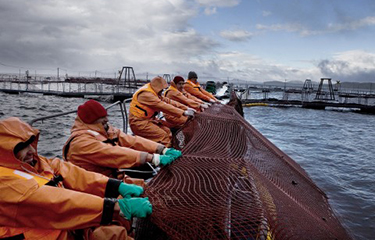Australis confident it will get reduction in possible USD 225 million in overproduction fines

Chile’s Environment Superintendency, SMA, has initiated the process of charging Puerto Varas, Chile-based Australis Seafoods with overproduction at several of its salmon farms.
The environmental authority accused Australis of 85,000 metric tons (MT) of overproduction between 2014 and 2022, and the company now faces a total fine equivalent of up to CLP 178 billion (USD 225 million, EUR 205 million), Diario Financiero (DF) reported.
Australis admitted to some overproduction via self-reports to the SMA acknowledging the company surpassed permitted production limits at 33 salmon grow-out centers. On 25 April, in response to both the self-reported violations and its own investigations, SMA filed 21 sanctioning procedures against Australis, including 52 serious infractions for overproduction and five minor charges for other environmental breaches it said took place between 2014 and 2022.
“This is a complex process, which seeks to gather the greatest amount of information to see if a self-report is accepted or not, and after which the respective sanctioning process follows,” SMA Superintendent Marie Claude Plumer said in a press release.
With a company that admits violations, the SMA conducts an analysis of information provided by the infringing company’s self-reporting to ensure its veracity. It also mandates a compliance and improvement program and requires the company to accept the punishment it receives, Plumer said.
In a statement sent to SeafoodSource, Australis said it was confident it would not face harsh SMA sanctions. Australis referred to the SMA’s 2018 auto-reporting guide, which “allows the offender to opt for the benefit of an exemption or reduction of the fine that would be applicable with respect to the offense(s) that are the subject of the self-report.” In other words, the SMA incentivizes self-reporting of violations by waiving all fines or offering significant reductions in fines for companies turning themselves in for overproduction.
Additionally, Australis initiated the process on SMA-required compliance programs on the same day it provided its overproduction reports to the agency.
“We are reassured with the phases that have been completed, and we are certain that self-reporting was the right path to take to ensure compliance with Chilean environmental regulations,” Australis told SeafoodSource in a statement. “As a company controlled by a responsible foreign investor, we know that self-reporting will have a negative impact in the short term, but we hope that justice sanctions those responsible considering the damage that third parties have generated to the company.”
Australis may end up paying much more to support the USD 1.22 billion (EUR 1.13 billion) lawsuit it filed …
Photo courtesy of Australis Seafoods





Share